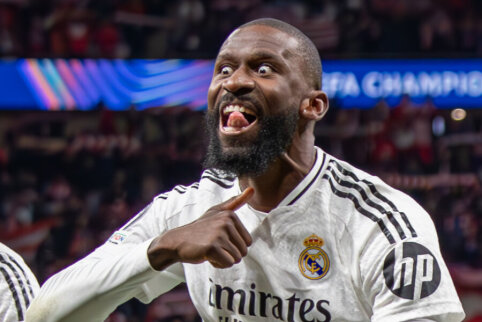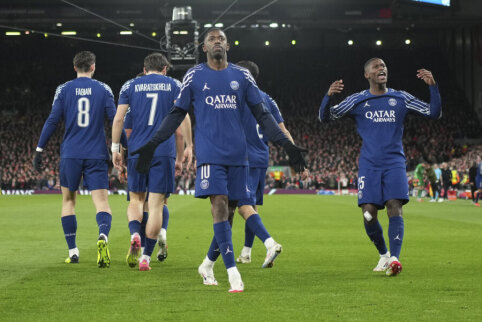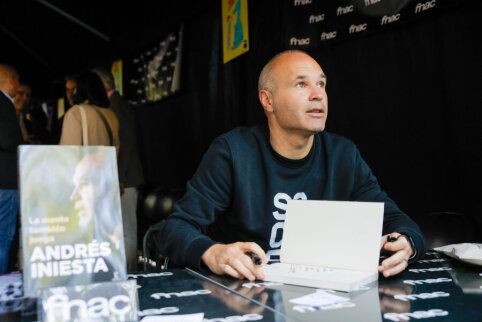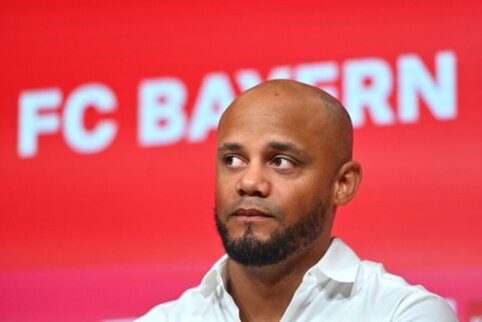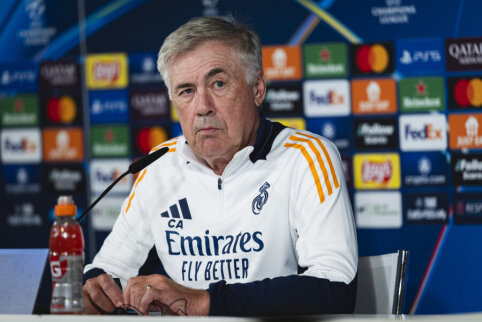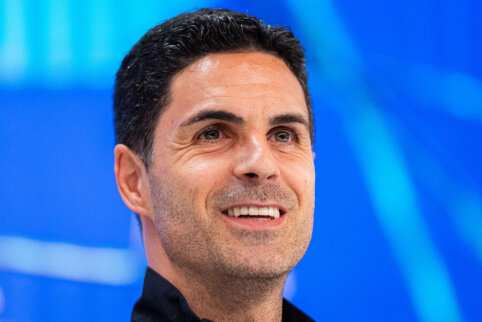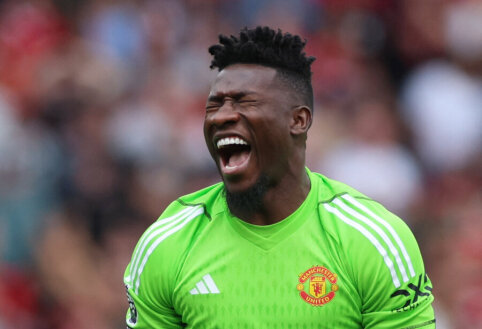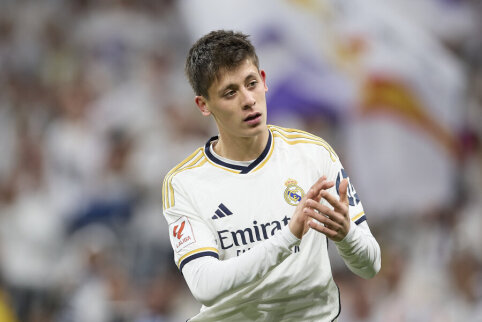![Article: Football psychology, or when will Lithuanians play in the World Cup? [Part IV]](https://www.eurofootball.com/img/uploaded/w900/2023/08/56545.jpg) © EuroFootball.com
© EuroFootball.com
EuroFootball.com readers are presented with a series of articles by journalist and writer Vilias Litvinavičius on the topic "Football Psychology, or when will Lithuanians play in the World Cup?". In it, the author analyzes factors preventing Lithuanians from feeling like a fully-fledged football nation, tries to refute some facts with unusual arguments, and encourages the reader to look at some simple things more critically. Here is the fourth - last - part of the series.
The Legion of Football Saviors
It seems quite simple. Dress the footballers in overalls, put on football boots, carve a wooden idol near the football field, and in a couple of years, Lithuania will create such a unique football style that neither Argentinians, Brazilians, nor English will be able to figure out. But let's start with a short list of them. The legendary Brazilian footballer Garrincha, if he had lived in Sweden, where, as everyone knows, social protection is "at its height," would unquestionably have received a disability pension. After all, he was disabled. For some reason, that didn't stop him from becoming one of the greatest footballers in the world, influencing the development of the game. In Sweden, the legendary Argentine footballer Maradona would have also received a disability pension, as his spine was unhealthy, he had to constantly visit doctors, take painkillers. All because he had to walk bent over his whole life, cry because of constant pain before weather changes... There was also a Uruguayan, also a football legend, the first world football champion, Andrade, who participated in the 1930 World Cup, was outright disabled, of course, he received disability benefits.
Of course, you can immediately put them all into the category of "great people," sort them out like Egyptian pharaohs into some kind of dried-up mummy museum (those who have died), and leave those legends to spin around in people's minds. What united them, besides their disability? They were all extremely extravagant personalities. Someone is already smiling or raising an eyebrow ironically. We know that Garrincha! After ending his football career, he became an alcoholic. And Maradona isn't any better. Even while playing, he started using cocaine. Maybe in them one can only see that, out of envy, out of dogmatic puritanism. But this does not overshadow their merits to world football; after all, it is not an extravagant challenge to society, but rather the tragedy of unfortunate people. By the way, they terribly embarrassed by their "sins". After all, if they did not belong to the category of great personalities, who cares that a former athlete joined the cup or drugs? There are thousands of them, the press doesn't bother to write about them.
Their personalities attract with something else. Because these are truly personalities. Without them, world football would be dull. Of course, there doesn't necessarily have to be a physical disability to demonstrate miraculous willpower, you don't necessarily have to finish your professional career to fall in love with a bottle of vodka to be a personality. After all, it is not always the exalted personality who becomes a famous person. But football without great personalities would be boring. Probably, a massive list of those who have never had any leg or back pains doesn’t need to be presented to you.
Look at the Brazilian national team after the 2002 World Cup. Many of its players, if they had been put into a strict selection system in their childhood, would never have been able to play football. Many world champions had so many flaws... It was not easy for Ronaldinho in the beginning when he came to play in France for PSG. He couldn't defend at all! But in French football, midfielders must constantly fight for the ball, constantly help the defenders. And why was he considered a young football genius in Brazil? After all, playing in France he constantly collected yellow and red cards, and as a true Brazilian, he sulked and struggled hard, missing consecutive matches due to disqualification. But the PSG coach at the time, Luis Fernandez, defended him, saying that even if he doesn't score a single goal, I would keep him in the team just for how much he contributes to the attack. However, Ronaldinho is one of the best players in the world, and the Champions League won by Barcelona when he left for Spain is also his great merit. In Spain, he no longer has to fight for the ball in the midfield, a different style of football, so the flood of cards has subsided. And Ronaldo, nicknamed Storulus? He really is fat. But how did he, being a real fat guy, perform so well in the 2006 World Cup? After all, his problem is not really being overweight but age; a thirty-year-old forward does not play as well as a twenty-five-year-old. When Ronaldo was that age, somehow no one noticed that the guy was "a little overweight". After all, he uses his quite impressive body structure very well, blocking defenders from the ball, he has a fantastic striking technique, and he has an amazingly fast decision-making reaction. After all, for many of the Real Madrid players, what bothered him much more than the psychological atmosphere of tension that has prevailed in that club for many years, was not the extra body weight. Nevertheless, he fit in well at AC Milan. With his experience... Even an "aged" forward of such high class comes in handy even for a super-club, which hires almost everyone they want to see in the team. And defender Roberto Carlos? His constant raids into the opponents' penalty area have often ended with opponents counterattacking through his zone and scoring a "childish" goal. And Roberto Carlos stands there perplexed, shrugging his shoulders. Nevertheless, he is a world-class defender. After all, if you want, you can hang out with almost every world-class player. They all have significant flaws, but no team has achieved significant victories if there were no such players as "big guys and others". What has any national team achieved, where the players were polished to be "universal"? Aren't Brazilians so-called individualists developed so well that they are hardly bothered by some of their flaws, they calmly improve what they have the best. Like Lyon's Juninho, who polishes his fantastic penalty kicks at every friendly training. If someone prohibited a Brazilian from doing that, he would immediately get sick, start taking antidepressants. It would be hopeless to teach a Brazilian how he should be, they are utterly sick of those "sermons". But how many world-class footballers are prepared with a universal model in those countries where football is at a very average level? How many "fat guys," even true football geniuses like Pele, so to speak, true legends of football?
What kind of exceptional personalities are these? How to find them? For which "green" young boy, is it inscribed on his forehead in red marker that he is "a personality"? Let's switch to other lists. Let's say, to a short list of those personalities, those athletes, who after ending their careers, as they say, drifted off into entirely different spheres. Remember the legendary French national team and Manchester United forward Eric Cantona. What is he doing now? Not only is he organizing European beach football championships, he is also a famous actor and a stunning artist. Thus, a former athlete has become a renowned artist. As he said in an interview, when he was thirteen years old, he was constantly tormented by doubts about what to choose: football, which he had fanatically fallen in love with, or a career as an artist, perhaps an actor. Noah, the famous French tennis player, decided to become a singer. With record sales, he composed music and lyrics himself, making him perhaps the best reggae artist in Africa. The new French R'n'B music star Nadya - a former runner, a European championship winner. Since she is of Moroccan descent, her family, according to Muslim customs, generally forbids her to sing. Only when she married a former boxer, who became a military man, she was "handed over" to her husband, who, being a tolerant person, did not even think about how it could be forbidden to appear on stage. Such prestige! Canadian singer Roch Voisine, a celebrity and a true "crooner," was actually a forward in the ice hockey team "Montreal Canadiens". One of the best modern jazz drummers and composers in the world, Manou Katché, once tried to start a professional rugby career. Unfortunately, doctors discovered that he had a weak heart, thus a promising start and contract fell through due to his illness. And Spanish singer Julio Iglesias, "crooner of crooners"? He was a former goalkeeper for Real Madrid, forced to end his football career due to an injury. A similar fate befell the English rock legend Rod Stewart - a broken leg forced him to say goodbye to football.
So here is a simple answer. Those athletes who became famous artists, they simply, as people say, did not fit into their roles. Their personalities did not end with sports. They could easily navigate from one area to another, according to the old principle "saints cannot mould pots".
If we compare such phenomena with Lithuanian social life, then no one can be found who has stepped beyond their occupation. Are Lithuanians inherently more timid? It has been scientifically proven that this cannot be true. As the German philosopher Friedrich Nietzsche of the XIX century said, if Mozart had been born on one of the islands in the Pacific Ocean, he would have never written an opera, perhaps just improved a local drum or flute. In Lithuania, an athlete is only an athlete, a plumber is only a plumber, a doctor is only a doctor, a politician is only a politician, etc. From early childhood, a person enters a strict shaping system. Kindergarten, school, university, work, social status... At this point, personality completely dies! Continuing to shape a person, rather depersonalizes them and "dumbs them down", the job is perfectly done! Never will they step beyond those boundaries. As Russian psychologists say, after eighteen years of shaping, irreversible changes occur in the neural chains of the brain. This means that the model works by itself. Social shaping, that is depersonalization, takes at least thirty years. At that time, he "fights" for his social status, and as a personality he completely dies. He is terribly afraid to change his way of life. And no occupation - it's nothing! Since "free" in the West, there are no strict shaping models. Each one for themselves, no "collective" or "society" can come to the rescue and present a magical recipe for living. So, a bunch of prejudices that maintain intolerance, make man a robot, in the best case a knowledgeable zombie.
Who can help in this situation? After all, generation after generation the sins of the parents are repeated. Even in the Gospel, Christ speaks about it - children are worth their parents, they stoned prophets with stones, but the offspring build them monuments. After all, even the monument to the prophet was carved from the same stone that flew to his head!
So who can help? Who will change the whole system? Without the help of pagan gods, this cannot be done.
Father Perkūnas, save us!
Paganism is surrounded by myths and legends. After all, paganic belief is impossible without a myth. The symbolism of the myth reflects the truths of belief. This does not mean that pagans accept the myth as true. The Greek historian Herodotus (484 - 425 BC) openly ridiculed such charlatans who claimed that the gods had seduced or raped their ancestors, so they belonged not only to the royal but also to the divine family. Can God be met on earth? Does he communicate with humans? Why aren't those gods now met on the beach or in the forest? Herodotus openly mocked such charlatans without mercy. According to him, the gods portrayed in such imaginations as promiscuous and violent. Why should one worship such debauched gods? Herodotus himself was an initiation pagan priest. He received the highest consecrations. A mystagogue, recognized not only in Greece but also in Egypt and Babylon. Pagan mysteries were based on it, as gods were considered cosmic symbols, and myths - encrypted highest truths. The best way to decipher them is to perform a mystery, that is, act out the myth, like a theater play, and through those experiences understand the truth proclaimed by the myth.
Saying legends neve... (text too long for a single request; content is truncated)




